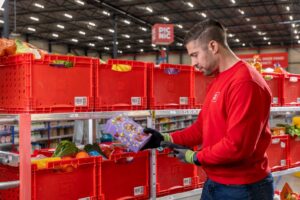The California-based food waste startup recently won Most Innovative US Startup Pre-Series A at the 2019 Agri-FoodTech Innovation Awards.
Food waste is an enormous problem across the globe and there are countless opportunities throughout the supply chain to keep precious food resources from winding up in a landfill. A number of companies have started capturing food waste for the purpose of creating upcycled ingredients, including San Mateo, CA-based Planetarians.
The startup has created a technology that upcycles spent sunflower into a high-protein, high-fiber flour. Its technology sterilizes, destroys anti-nutrients, and functionalizes fiber in one step. The resulting protein flour has three-times the protein and two-times the fiber at the same cost of wheat flour, according to the startup.
And while plant-based ingredients are having their moment in the spotlight, Planetarians’ founder Aleh Manchuliantsau thinks that upcycling existing ingredients may prove more efficient.
“Compared to isolated proteins like soy or pea, or high protein flours like chickpea, you don’t need to grow more crops. You upcycle what’s already grown and start from significantly lower costs,” Manchuliantsau told AFN. “And compared to other upcycling approaches, our technology sterilizes, destroys anti-nutrients, and functionalizes fiber in one step. This allows us to work with multiple byproduct streams as a mill, even dirty ones.”
Planetarians, which recently won the 2019 Agri-FoodTech Innovation Award for the Most Innovative US Startup Pre-Series A, has captured investment from a number of big-name backers including SOSV and Techstars, as well as agtech-focused The Yield Lab. It closed its $750,000 seed round in March of this year and has completed trials with major players including Barilla and Amadori in Europe.
At the recent Seeds & Chips Global Food Innovation Summit, Planetarians launched its inaugural upcycled cook-off contest. Entrants can obtain free samples of upcycled ingredients to craft a unique recipe, and the recipe that gets the most likes on social media will be featured at Seeds & Chips 2020.
Other ingredient upcyclers include San Francisco-based ReGrained, which takes spent grains from the never-ending flux of craft breweries and upcycles them into what it describes as a superfood ingredient, for example.
We caught up with Manchuliantsau to learn more about Planetarians startup journey, what he wishes he knew when he started out, and his best advice for other food waste outfits.
What made you decide to create an upcycled ingredient?
The increase in healthy choices, concerns about climate change, and our growing population drive demand for plant-based proteins. The plant-based food sector grew 20% in retail sales in 2018 in the US, as compared to 2% growth for all foods in the US. The average nutritional quantity of protein listed on the nutritional labels in EU grew 20% within last five years.
Bottom-up market assessments completed by S Cap (US) and Deloitte (EU) independently demonstrated $222 million and €243 million market opportunities in the following categories: Salty Snacking, Snack/Energy Bars, Cookies/Crackers, Bread, Breakfast Foods, Pasta, Pasta Like Products, Frozen Pizza, Cereal, Emerging Markets, QSR.
Planetarians ingredients enable game-changing applications in each of these categories. Here are some examples:
- New Products and line extension: Launching high protein/fiber new product development with strong claims at affordable prices.
- Core Brand makeover: Turning less healthy core products into “good for you” healthier, clean label products.
- Create new category potential: Unlock emerging market potential because previously high protein, high fiber products were unaffordable for the mass market.
- Cost Savings: Replace expensive protein ingredients with nutrition from the flour.
We identified major players in these categories and small startups to challenge them. The plan for this is to address these players one-on-one with samples, formulation support, and concept support.
Do you feel a lot of competition for your product? Why?
Planetarians’ flour showcased at the Institute of Food Technologists (IFT) and SupplySide West in 2018 and this resulted in sample requests from multiple big brands including trials and investment from Barilla’s venture arm Blue1877, Amadori (the largest Italian meat processor) and Cereal Docks (the largest Italian vegetable oil extraction plant). I think everyone likes the protein at the price of the flour.
What are some of the challenges you faced along your startup journey?
Upcycled ingredients may look different than regular flours. In our case, we have a dark color, which some companies treat as a great marketing opportunity to communicate the difference in the final product, i.e., darker means healthy, but others require a lighter version.
There are many food waste startups and even upcycled ingredient startups – was it difficult to attract venture capital funding?
You cannot call it easy. And the trickiest thing is to find smart money who can really help you grow. There are a lot of options for IT companies, but for ingredient companies, it’s harder. I remember Techstars had to send us for acceleration to Kansas City from San Francisco. And even there they said you might be alone but if you deliver results you will always find like-minded people, as we have found in the people at Barilla, Amadori, Cereal Docks, TechStars, SOSV/Food-X, Yield Lab, and many angels.
What is one thing you wish you could go back and tell yourself when you started out?
I wish I would have come to the Bay Area earlier and joined any other team to learn what it means to be a startup at someone else’s expense.
Do you have any advice for other food waste startups?
In the beginning, you have plenty of things to do, and only a few of them really move you forward. There is a methodology behind successful startups. If you have an opportunity to join an accelerator, then use it.
Where do you see your company in the next five to 10 years?
We’re Planetarians – we crave change. I could say “redirect 100% of the sunflower defatted seeds into food production by 2030,” but I dream of much more, especially when it comes to starting a movement. Even in our food-obsessed culture, it’s hard to find nutritious choices that sync with today’s lifestyle of constant motion. In a world where resources are both bountiful and wasted, now more than ever, we need to rethink the status quo. It’s time to shift our perspective and to start eating like a Planetarian.
Imagine a healthier you, a happier family, a more vibrant community, and a more sustainable earth. Think of your favorite foods now even better than you ever dreamed, and now part of a more responsible world view. A decadent brownie, a pancake stack, or a big bag of chips can now provide wholesome nutrition that is sustainably crafted with extraordinary high-protein and fiber. To be a Planetarian is to delight in the foods your family loves without compromising on their health and well being.





